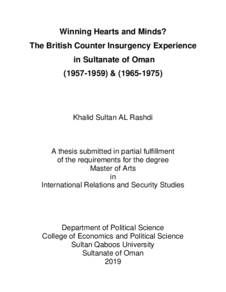Document
Winning hearts and minds? : the British counter insurgency experience in Sultanate of Oman (1957-1959) & (1965-1975).
Publisher
Sultan Qaboos University.
Gregorian
2019
Language
English
Subject
English abstract
Insurgency and its tactics are as old as warfare itself. Most modern warfare occurs in
the form of insurgencies which has become a rather problematical term. It is probably fair to say
that in many ways it mixes with peaceful calls for self-determination or the public demands for
reforms. One of the main objectives of many insurgency movements is to replace the existing
government and make an alternative one acceptable to the people. In doing so, insurgents follow
different tactics as they engage in guerrilla warfare.
There is a great debate about the nature of counter insurgency operations. Is it purely
part of the military operations? Or is it rather civilian-centric efforts with the support of security
forces? To this day we remain unconvinced regarding the best way of approaching counter
insurgencies. As a concept, the "insurgent" term remained elusive too. Some of the literature in
this field has been preoccupied with the power values based on the realist theory which provides
a powerful basis for explaining the aggressive military behavior against insurgents.
In the absence of measurable methods within which we might interpret success or
failure, counter insurgency operations remain very complicated to evaluate. The traditional
metric of success in conventional warfare focuses on "defeating the enemy" or the use of all
possible means to force him to surrender. This metric is inapplicable in the counter insurgency
operations where the main purpose is to gain the people's support and persuade the insurgents
to join the government side with limited use of force.
Being one of the main pillars of the classical British school of counter insurgency,
"winning hearts and minds" remain the dominion in all British operations. The purpose of this
study is to examine the British approach to counter insurgency in the Sultanate of Oman during
twentieth century. The reason is that local literature reveals the absence of a comprehensive
study that critically analyses Omani insurgencies and evaluates the extent to which Britain
employed the principle of "winning hearts and minds". This study intends to explore how the
counter insurgencies were won based on analyses of two case studies namely: Al Jebel AlAkhdar War (1957 - 1959) and Dhofar War (1965 - 1975).
Member of
Resource URL
Arabic abstract
لقد كان لحرب الجبل الإخضر و ظفار أهمية بالغة في تاريخ عمان الحديث حيث تمكنت الحكومة من مواجهته بما توفرلديها ة من أدوات وسبل مستفيدة من علاقاتها التاريخية مع بريطانيا والتي وطدت عبر تاريخ طويل من التعاون المشترك حيث كان للمساعدات العسكرية البريطانية سواء خلال حرب الجبل الإخضر وحرب ظفار دورا بارزا في توفيرالظروف العسكرية المناسبة التي أدت غلى إنهاءتلك التحديات.
يعد مصطلح "مكافحة التمرد" من المصطلحات القديمة الحديثة ف راسات الإمنية حيث يطلق عىل عملية نشأت بشكل مالحظ بعد الحرب العالمية الثانية رت مكافحة الجماعات المسلحة ذات الإهداف السياسية المختلفة وال وتختلف توجهات تلك الجماعات من بلدآلخربحسب ظروفه السياسية والإجتماعية والإقتصادية. يعد مبدأ الفوز بالقلوب والعقول من ا عمليات مكافحة التمرد
يعد مصطلح "مكافحة التمرد" من المصطلحات القديمة الحديثة ف راسات الإمنية حيث يطلق عىل عملية نشأت بشكل مالحظ بعد الحرب العالمية الثانية رت مكافحة الجماعات المسلحة ذات الإهداف السياسية المختلفة وال وتختلف توجهات تلك الجماعات من بلدآلخربحسب ظروفه السياسية والإجتماعية والإقتصادية. يعد مبدأ الفوز بالقلوب والعقول من ا عمليات مكافحة التمرد
Category
Theses and Dissertations

